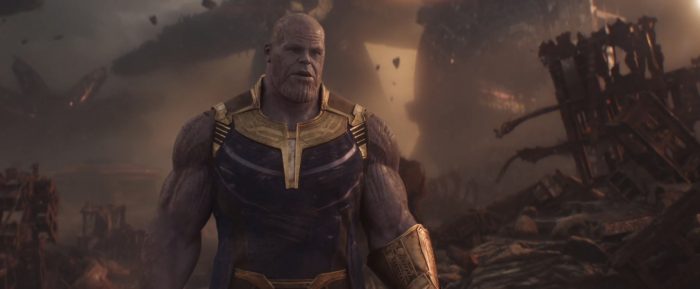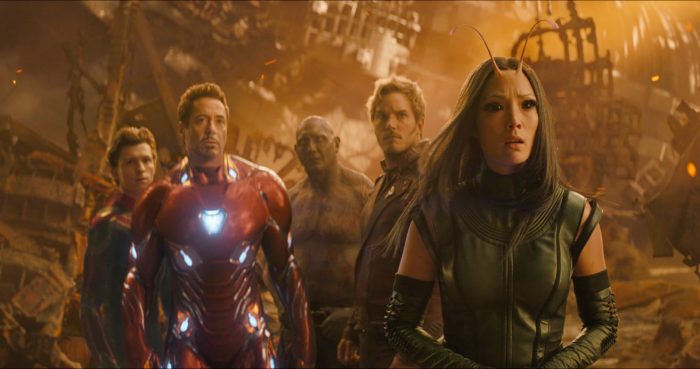'Avengers: Infinity War' Review Round-Up: A Jaw-Dropping Spectacle With Emotional Stakes
Thanos is here, and death is coming with him. (Not the character of Death, just plain old regular death.) Avengers: Infinity War, Marvel Studios' newest star-studded cinematic team-up, has screened for critics before its official release later this week, and the reviews are in. As I write this, the movie sits at 87% on Rotten Tomatoes, and a majority of the reviews approach the film with a healthy mixture of skepticism and awe. That seems appropriate for a film that is simultaneously the latest piece of corporate synergy and also the biggest entry in longform studio storytelling on a scale we've never seen before.
Read on to hear what critics – including us – have to say about the next entry in the Marvel Cinematic Universe.
Avengers Infinity War Reviews
Let's kick things off with our own review from Josh Spiegel, who praises the cast's efforts but has a few issues with Josh Brolin's Thanos:
Brolin, to be fair, is fine as the literal Big Bad. For the first time, an MCU movie attempts to flesh out this character hell-bent on galactic genocide; unfortunately, Brolin's firm motion-capture performance can't hide the feeling that even now, Thanos is a dull, one-dimensional baddie. He exists to be hissed at by the audience — there's a specific scene that tries to humanize him even as he does something unforgivable on a person-to-titan scale that fails to have it both ways. Thanos' cruelty is ill-formed on the big screen, as has been the case with too many MCU villains.
Thus, while the massive fight sequences in the latter half of Infinity War may approach a suitably epic scale, they suffer from the same problems that plague a lot of these films. The dynamic and exciting heroes are facing an endless slew of basically shapeless aliens straight out of a video game. The stakes are high enough, but the threat of Thanos, even after all the buildup, never feels that threatening. But that speaks to the other unavoidable problem: whatever it ends up being called, there will be another Avengers movie next May, as Marvel follows in the footsteps of the Harry Potter franchise and splits one story into two films, with a cliffhanger that concludes this one.
Susana Polo at Polygon shared some of those same problems with Thanos, and she also points out one of the relationships the movie desperately wants you to feel invested in (for me, Infinity War only earns that investment between them in one brief moment):
The filmmakers gamely attempt to make an audience feel invested in Vision and Wanda, two characters whose development has happened almost entirely off-screen — not even Paul Bettany's considerable puppy dog eyes could make me care about their relationship. Infinity War also does a lot of heavy lifting to turn Thanos into the compelling arch-nemesis that the Marvel Cinematic Universe has been desperately trying to recreate since Loki's post-Avengers semi-redemption. But in the end, no matter how many times you have him or one of his lackeys monologue about his motivations, he remains neither sympathetic nor even empathetic.

I was more mixed on Thanos, myself – he mostly works as a villain, but what is his endgame, to relax after wiping out half the universe? – but as Bryan Bishop at The Verge writes, the rest of the movie balances out his grim dedication to achieving that dastardly goal:
The film's sparkling sense of humor balances the weight of Thanos' actions. Marvel's films have always had a flair for comedy, but Infinity War turns the dial up further, maximizing the levity found in movies like Thor: Ragnarok and Guardians of the Galaxy. Pitting Star-Lord's hyper-insecurity against Thor's arrogant hyper-masculinity provides for some of the funniest moments in the entire MCU.
Doctor Strange and Tony Stark also play as comedic foils for each other, sparring over what might as well be the title for Most Arrogant Superhero On Earth. In a film that mixes so many different elements, it would be easy for many of these characters' essential traits to fall by the wayside. But the Russo brothers don't just preserve the characters' innate sensibility. They're actually able to incorporate the filmmaking sensibilities of the different franchises into their own tapestry.
The Hollywood Reporter's Todd McCarthy wondered how the movie would handle the conflicting personalities of so many superheroes at once, and found the film's solution to that question satisfying:
The sharp-witted answer delivered by writers Christopher Markus and Stephen McFeely and directors Anthony and Joe Russo, under the supervision of Marvel Films maestro Kevin Feige, is to acknowledge the traffic jam of egos and play it for laughs. The effect is both scatter-shot and precise, knowing and witty enough to be initially disarming and ultimately ingratiating. With more limited screen time than they're used to and even more limited elbow room, the actors and characters (in what at least some knew would be their swan songs in these costumes) snap off one-liners and sharp remarks with an extra edge of sarcastic disdain. They don't exactly send up their heroic characters, but there is more of a subtle commentary underneath it all (not so subtle in the case of Mark Ruffalo's and Evans' roles) about the frustrations of having two different personas in life.

Alex Abad-Santos at Vox was also impressed by the interplay between the movie's many heroes:
Not all of the film's heroes are underutilized, though. Tony Stark's (Robert Downey Jr.) fear of a galactic threat, established over the past few films featuring him, is fully realized in Thanos, and Downey sinks his teeth into Stark's vulnerability and apprehension. Stark has to not only defeat this villain but also reconcile that mission with the fact that Thanos's plan is horrifyingly adjacent to Stark's dream of a universe so safe that Avengers are rendered obsolete.
Benedict Cumberbatch's Doctor Strange and Chris Hemsworth's Thor are apt counters to Stark. Cumberbatch's Strange is coolly stubborn, calculating in ways that Stark isn't. And Hemsworth, after flexing his knack for comedy in 2017's Ragnarok, taps into that same humor but laces it with jagged grief and anger informed by having seen Thanos's wrath firsthand.
Elsewhere, it sounds like A.O. Scott at The New York Times wasn't impressed by the spectacle of it all:
The action is especially tedious and predictable. I mean both the scenes of fighting and flying and the overall rhythm of the first two hours or so. People talk for a while, sprinkling jokes and morsels of personality into the heavy dough of exposition. Then they fight in the usual way, by throwing giant objects (and one another) and shooting waves of color from their hands. The noisy, bloated spectacles of combat were surely the most expensive parts of the movie, but the money seems less like an imaginative tool than a substitute for genuine imagination.
However, even he acknowledges that the ending has a certain power to it:
But where you end up may not be where you thought this was going. The final act, including the post-credits sting (to infinity and beyond, as it were) brings a chill, a darkness and a hush that represent something new in this universe. "Infinity War" is the first half of the final installment in the series, and it concludes with a premonition of finality. Its intimations of grief and terror feel shrewdly attuned to what is happening in the actual, unmarvelous world.
Remember how I mentioned the mixture of awe and skepticism in the beginning of this piece? Vanity Fair's Richard Lawson wrote a review that explicitly mentions that dichotomy:
The movie is a relentless clobberer, going fast and hard on action and exposition, managing a few pensive moments here and there, but mostly raging at full blare for its 150-minute run. That outsized aural and visual register is something we've grown accustomed to, in the Avengers films and others. But it plays just that much louder in Infinity War, the film towering over us (and the mid-spring cinematic landscape) with such sleek, assured dominance that one feels half cowed into awe and half sick about the corporate slavishness of it all. I cringed when my audience applauded the Marvel logo, and yet felt a frisson of true excitement when we gasped in pain and surprise at the (likely temporary) death of a beloved character. Infinity War is much like Thanos, terrifying and magnificent in its bigness, both unfeeling juggernaut and alluring giant ribboned with pathos.
Avengers: Infinity War arrives in theaters on April 27, 2018.
